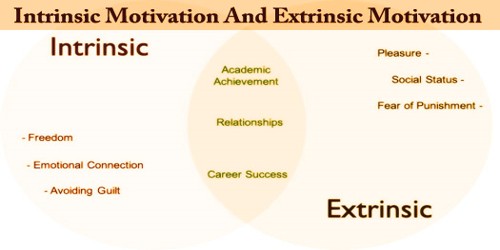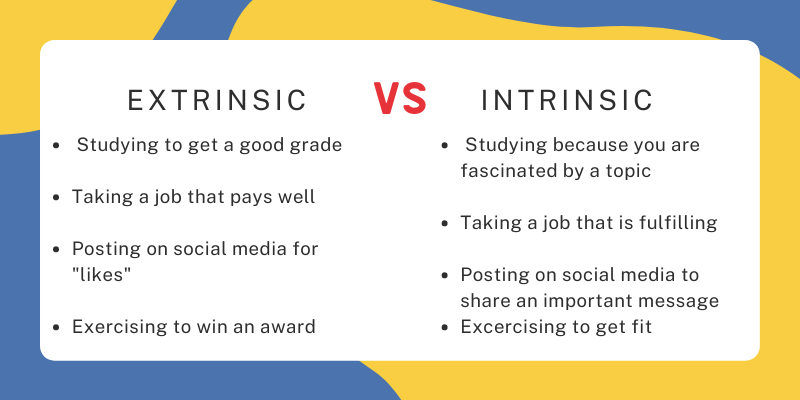


Both professions require high levels of competency that must be acquired over decades-not a short period of time. In a 2016 article, researchers at Bucknell University asked how doctors and nurses remained motivated over the duration of their careers. How extrinsic and intrinsic motivation impact work Do consider whether you’re driven more by extrinsic or intrinsic motivation at work, and what this means for your job. And do you truly not enjoy anything unless someone else is validating you? Also unlikely.ĭon’t worry about permanently identifying with one or the other camp. Would you do your job every day without pay simply for the pleasure of doing it? Probably not. Even if one set of options felt more relatable to you, we all need both extrinsic and intrinsic motivation. Of course, no one is only motivated by just one or the other. Outside of work, that might look like running because you like running, studying because you’re interested in a subject or cleaning up because you prefer a clean environment. You’d be driven to succeed even if no one were watching or measuring. For you, performing well is a high of its own. It’s often described as an interest in doing an activity for its own sake, for personal satisfaction or because you find it meaningful. If one of the above rang true for you, you might be driven by intrinsic motivation, which comes from within. Maybe you can’t wait to reflect on how you drove your own development over the course of the project and improved your skills. Or maybe you’re looking forward to feeling like you’ve contributed to your team’s mission by delivering good work? You like feeling like you did a good job, and you’re proud to have your name on the final presentation. Maybe you’re excited to finish the project because of the sense of personal satisfaction. You care about doing well not just for the sake of having done well, but rather for the reward that doing well provides (or to avoid the consequences of not having done well).īut maybe none of those sounded right. Outside of work, it might look like pushing yourself to run so you can place first in a race, studying in order to ace a test, or cleaning your apartment to avoid getting into a drawn out fight with your partner about chores. Extrinsic motivation comes from external rewards such as money, recognition, appreciation or other tangible benefits. If one of those hypotheticals resonated with you, you might be more extrinsically motivated. Maybe it’s that you’re that much closer to getting that promotion, now that you’ve shown you can successfully manage a major priority. Or is it the extra-large bonus you’ll get at the end of the quarter for hitting your goal? Is it the fact that your boss will call you out as the team MVP in this week’s team meeting for finishing the project on time and under budget? What is it that excites you the most about reaching the finish line? Imagine that you’re in the final stretch of a long project. Okay, so is it extrinsic or intrinsic motivation that drives you? This in turn results in greater satisfaction and lower turnover costs. Research shows that employees with resources and opportunities that line up with their motivation style experience a higher sense of job autonomy. Performance at work (both on a personal and company-wide level) depends on how individuals are motivated and enabled to achieve.īeing able to navigate between extrinsic and intrinsic motivation for yourself and others can pay off-literally. Understanding how extrinsic and intrinsic motivation play out in different scenarios is especially important at work. If you’re externally motivated, you may feel more driven when you know money, praise or other prizes are on the table. Mental characteristics vary greatly and what motivates us is no exception.ĭo internal goals inspire your choices? Or do external factors play a bigger role in driving you to do something? If you’re intrinsically motivated, you don’t need a reward in order to do things you’re inspired by the pleasure you get from doing them. For example, the internet was abuzz a few weeks ago with a discussion about people who process thoughts through an internal monologue and those who don’t. And that goes beyond what we think-which political party we support or whether we believe that Rihanna was great or spectacular in Ocean’s Eight-into how we think. One of the beautiful things about humans is that we all think differently.


 0 kommentar(er)
0 kommentar(er)
